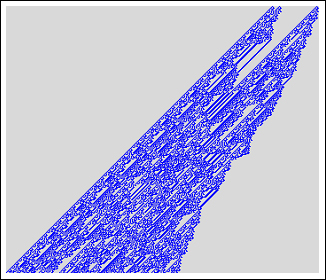Alumni

Bio
Matthew Kaproth is a PhD student in plant biology at the University of Vermont, advised by Jane Molofsky and planning to graduate in 2011. He has a 2008 MS in biology from West Virginia University.
He has a particularly strong interest in invasive species. He has conducted numerous studies using plants, such as purple loosestrife (Lythrum salicaria) and the tree-of-heaven (Ailanthus altissima), focusing on their invasive patterns of spread.
He hopes to develop his skills in spatially explicit modeling, combing habitat characterizations, plant demography, and GIS analysis. He hopes that computer modeling may allow for not only predictions of where a species will spread, but also when and under what circumstances this invasion may change.
Project: Using Two-Dimensional Cellular Automaton with Memory to Model Invasive Growth
Invasive growth will be investigated using outer totalistic two-dimensional cellular automata with memory as a model system by exploring their range of behavior (i.e. what they do). The memory inclusion will serve as a signature of a persisting establishment to identify patterns that match behavior expected for invasive species–specifically a reduction of the Allee effects (non-viable populations due to low rates of reproduction in a sub-critical density establishment; Allee 1931).
With an establishing species, one of three outcomes is typically seen: die-off, naturalization, or invasion. If the starting population is low, one may see an Allee effect (die-off), due to the inability to reproduce or withstand dynamic disturbances. The outer totalistic, four-neighbor, two-dimensional cellular automaton (with and without memory) rule space will be systematically explored for outcome regime change, using varying initial conditions (e.g. density). The advantage of finding a simple rule depicting this pattern may allow positing of what basic mechanisms drive invasive behavior and population viability.
References
Alee, W. C. Animal Aggregations: A Study in General Sociology. University of Chicago Press, 1931.
Favorite Radius 3/2 Rule
Rule 9882
